初中英语不定代词讲解及习题
- 格式:doc
- 大小:60.50 KB
- 文档页数:4
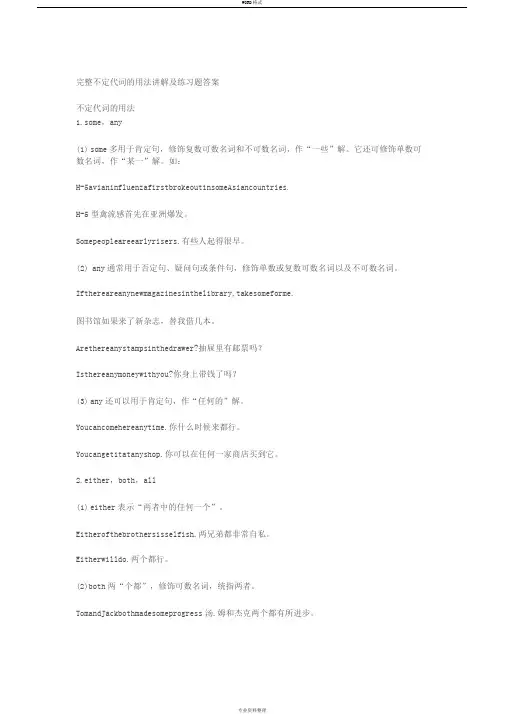
完整不定代词的用法讲解及练习题答案不定代词的用法1.some,any(1)some多用于肯定句,修饰复数可数名词和不可数名词,作“一些”解。
它还可修饰单数可数名词,作“某一”解。
如:H-5avianinfluenzafirstbrokeoutinsomeAsiancountries.H-5型禽流感首先在亚洲爆发。
Somepeopleareearlyrisers.有些人起得很早。
(2)any通常用于否定句、疑问句或条件句,修饰单数或复数可数名词以及不可数名词。
Ifthereareanynewmagazinesinthelibrary,takesomeforme.图书馆如果来了新杂志,替我借几本。
Arethereanystampsinthedrawer?抽屉里有邮票吗?Isthereanymoneywithyou?你身上带钱了吗?(3)any还可以用于肯定句,作“任何的”解。
Youcancomehereanytime.你什么时候来都行。
Youcangetitatanyshop.你可以在任何一家商店买到它。
2.either,both,all(1)either表示“两者中的任何一个”。
Eitherofthebrothersisselfish.两兄弟都非常自私。
Eitherwilldo.两个都行。
(2)both两“个都”,修饰可数名词,统指两者。
TomandJackbothmadesomeprogress汤.姆和杰克两个都有所进步。
Bothofthemshouldmakeconcessions.他们双方都应做出让步。
(3)all全“部,所有的”,修饰可数名词和不可数名词,指两个以上的人或物。
Allthestudentscontributedtothefund.所有的学生都为基金会捐了款。
Allofthemoneyhasbeenspent.钱都花完了。
Weareallforyou.我们都支持你。
Sayallyouknowandsayitwithoutreserve.知无不言,言无不尽。
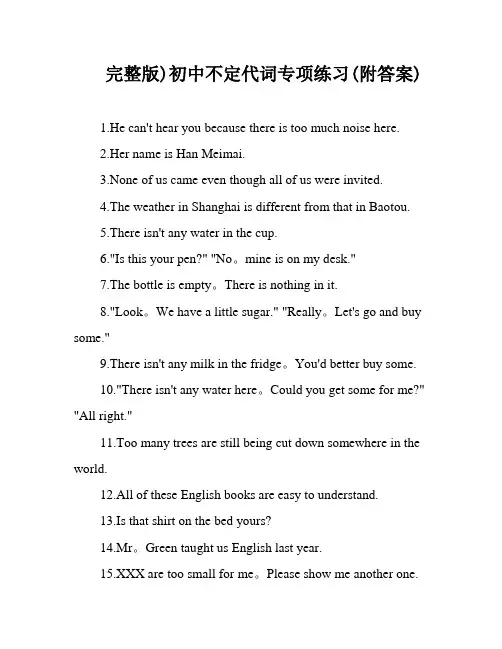
完整版)初中不定代词专项练习(附答案)1.He can't hear you because there is too much noise here.2.Her name is Han Meimai.3.None of us came even though all of us were invited.4.The weather in Shanghai is different from that in Baotou.5.There isn't any water in the cup.6."Is this your pen?" "No。
mine is on my desk."7.The bottle is empty。
There is nothing in it.8."Look。
We have a little sugar." "Really。
Let's go and buy some."9.There isn't any milk in the fridge。
You'd better buy some.10."There isn't any water here。
Could you get some for me?" "All right."11.Too many trees are still being cut down somewhere in the world.12.All of these English books are easy to understand.13.Is that shirt on the bed yours?14.Mr。
Green taught us English last year.15.XXX are too small for me。
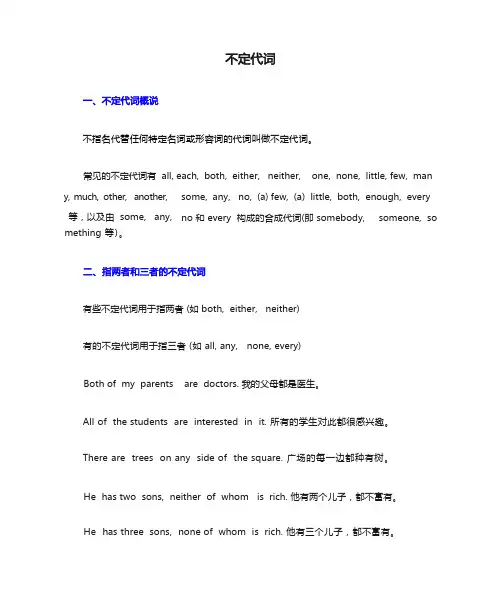
不指名代替任何特定名词或形容词的代词叫做不定代词。
常见的不定代词有 all, each, both, either, neither, one, none, little, few, many, much, other, another,等,以及由 some, any, mething 等)。
some, any, no, (a) few, (a) little, both, enough, every no 和 every 构成的合成代词(即 somebody, someone, so有些不定代词用于指两者 (如 both, either, neither)有的不定代词用于指三者 (如 all, any, none, every)Both of my parents are doctors. 我的父母都是医生。
All of the students are interested in it. 所有的学生对此都很感兴趣。
There are trees on any side of the square. 广场的每一边都种有树。
He has two sons, neither of whom is rich. 他有两个儿子,都不富有。
He has three sons, none of whom is rich. 他有三个儿子,都不富有。
each 可用于两者、三者或三者以上,而 every 只用于三者或三者以上,因此用于两者时只能用 each ,不能用 every 。
如:不能说 There are trees on every side of the road.复合不定代词包括 something, somebody, someone, anything, anybody, any one, nothing, nobody, no one, everything, everybody, everyone 等。
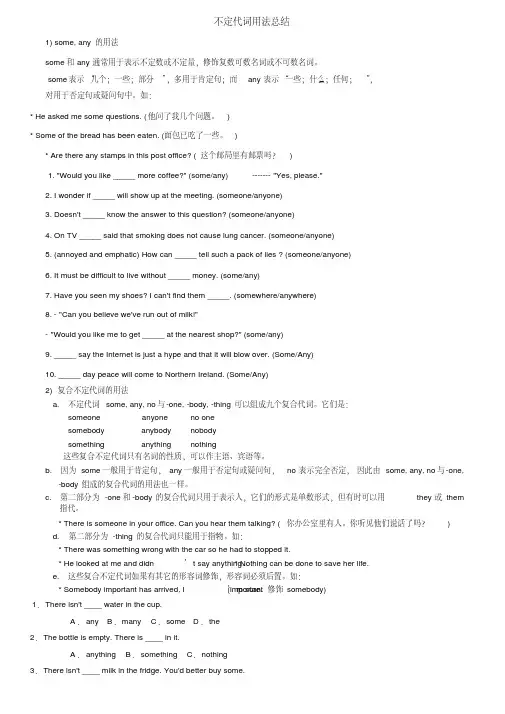
不定代词用法总结1) some, any的用法some和any通常用于表示不定数或不定量,修饰复数可数名词或不可数名词。
some表示“几个;一些;部分”,多用于肯定句;而any表示“一些;什么;任何;”,对用于否定句或疑问句中。
如:* He asked me some questions. (他问了我几个问题。
)* Some of the bread has been eaten. (面包已吃了一些。
)* Are there any stamps in this post office? (这个邮局里有邮票吗?)1. "Would you like _____ more coffee?" (some/any) -------"Yes, please."2. I wonder if _____ will show up at the meeting. (someone/anyone)3. Doesn't _____ know the answer to this question? (someone/anyone)4. On TV _____ said that smoking does not cause lung cancer. (someone/anyone)5. (annoyed and emphatic) How can _____ tell such a pack of lies ? (someone/anyone)6. It must be difficult to live without _____ money. (some/any)7. Have you seen my shoes? I can't find them _____. (somewhere/anywhere)8. - "Can you believe we've run out of milk!"- "Would you like me to get _____ at the nearest shop?" (some/any)9. _____ say the Internet is just a hype and that it will blow over. (Some/Any)10. _____ day peace will come to Northern Ireland. (Some/Any)2) 复合不定代词的用法a. 不定代词some, any, no与-one, -body, -thing可以组成九个复合代词。
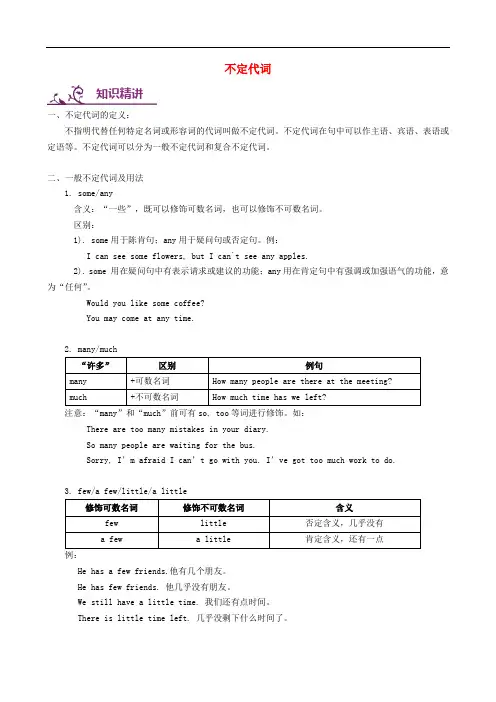
不定代词知识精讲一、不定代词的定义:不指明代替任何特定名词或形容词的代词叫做不定代词。
不定代词在句中可以作主语、宾语、表语或定语等。
不定代词可以分为一般不定代词和复合不定代词。
二、一般不定代词及用法1. some/any含义:“一些”,既可以修饰可数名词,也可以修饰不可数名词。
区别:1). some用于陈肯句;any用于疑问句或否定句。
例:I can see some flowers, but I can`t see any apples.2). some 用在疑问句中有表示请求或建议的功能;any用在肯定句中有强调或加强语气的功能,意为“任何”。
Would you like some coffee?You may come at any time.2. many/much注意:“many”和“much”前可有so, too等词进行修饰。
如:There are too many mistakes in your diary.So many people are waiting for the bus.Sorry, I’m afraid I can’t go with you. I’ve got too much work to do.3. few/a few/little/a little例:He has a few friends.他有几个朋友。
He has few friends. 他几乎没有朋友。
We still have a little time. 我们还有点时间。
There is little time left. 几乎没剩下什么时间了。
4. both, either, neither, all, every, none5. “other” 、“another”、“others”和“the others”例:I have two pencils. One is yellow, the other is red.I don’t like this green pe ncil, please give me another one.In our class, some students like playing football, others like playing basketball.There are seven people in Running Man. One is a woman, and the others are men.三、复合不定代词及用法1. 复合不定代词的构成:复合不定代词是由some-,any-,no-,every-加上-one,-body,-thing 所组成的不定代词。
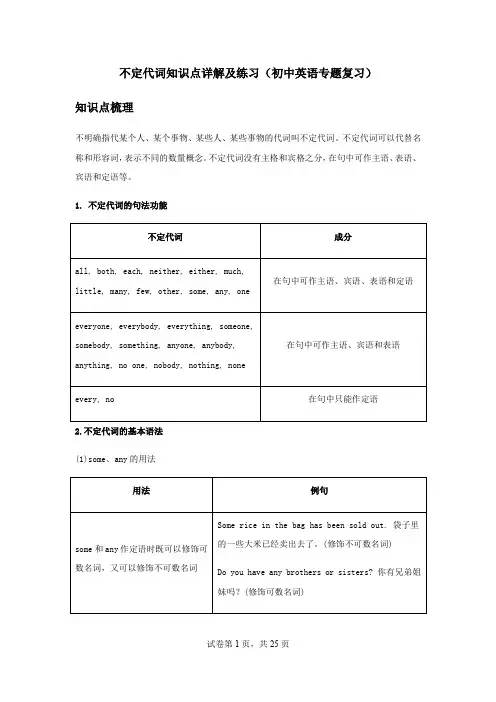
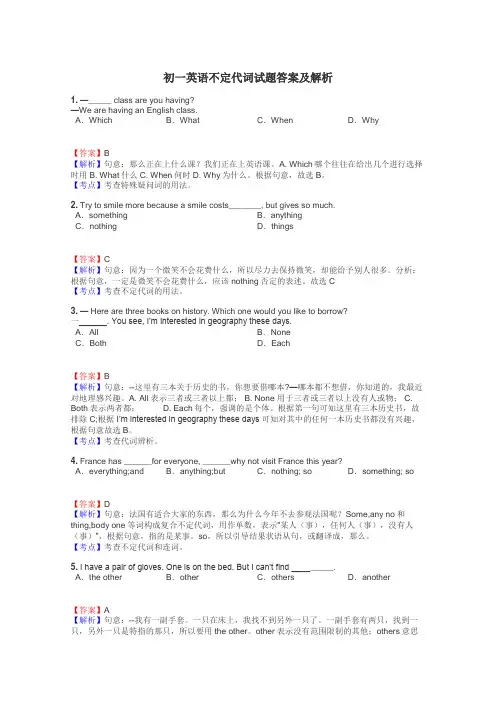
初一英语不定代词试题答案及解析1.—_____ class are you having?—We are having an English class.A.Which B.What C.When D.Why【答案】B【解析】句意:那么正在上什么课?我们正在上英语课。
A. Which哪个往往在给出几个进行选择时用B. What什么C. When何时D. Why为什么。
根据句意,故选B。
【考点】考查特殊疑问词的用法。
2. Try to smile more because a smile costs_______, but gives so much.A.something B.anythingC.nothing D.things【答案】C【解析】句意:因为一个微笑不会花费什么,所以尽力去保持微笑,却能给予别人很多。
分析:根据句意,一定是微笑不会花费什么,应该nothing否定的表述。
故选C【考点】考查不定代词的用法。
3.— Here are three books on history. Which one would you like to borrow?一______. You see, I’m interested in geography these days.A.All B.NoneC.Both D.Each【答案】B【解析】句意:--这里有三本关于历史的书,你想要借哪本?—哪本都不想借,你知道的,我最近对地理感兴趣。
A. All表示三者或三者以上都; B. None 用于三者或三者以上没有人或物; C. Both表示两者都; D. Each每个,强调的是个体。
根据第一句可知这里有三本历史书,故排除C;根据I’m interested in geography these days可知对其中的任何一本历史书都没有兴趣,根据句意故选B。
【考点】考查代词辨析。
4. France has ______for everyone, ______why not visit France this year?A.everything;and B.anything;but C.nothing; so D.something; so【答案】D【解析】句意:法国有适合大家的东西,那么为什么今年不去参观法国呢?Some,any no和thing,body one等词构成复合不定代词,用作单数,表示“某人(事),任何人(事),没有人(事)”,根据句意,指的是某事。

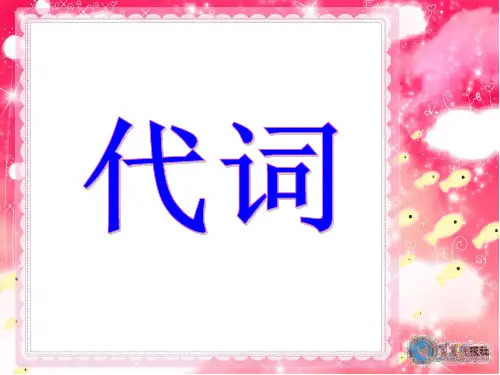
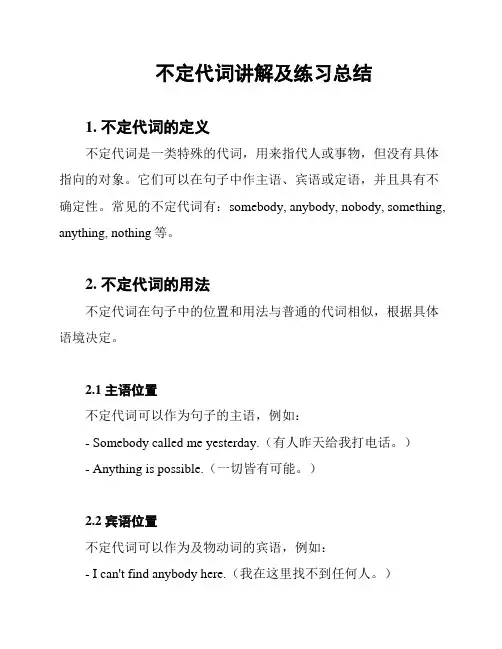
不定代词讲解及练习总结1. 不定代词的定义不定代词是一类特殊的代词,用来指代人或事物,但没有具体指向的对象。
它们可以在句子中作主语、宾语或定语,并且具有不确定性。
常见的不定代词有:somebody, anybody, nobody, something, anything, nothing等。
2. 不定代词的用法不定代词在句子中的位置和用法与普通的代词相似,根据具体语境决定。
2.1 主语位置不定代词可以作为句子的主语,例如:- Somebody called me yesterday.(有人昨天给我打电话。
)- Anything is possible.(一切皆有可能。
)2.2 宾语位置不定代词可以作为及物动词的宾语,例如:- I can't find anybody here.(我在这里找不到任何人。
)- Have you seen something strange?(你见过什么奇怪的东西吗?)2.3 定语位置不定代词可以用作名词的修饰语,例如:- Is there anything important in the letter?(信中有重要的东西吗?)- I need somebody reliable to help me.(我需要一个可靠的人来帮助我。
)3. 不定代词的练为了更好地掌握不定代词的用法,以下是一些练题:3.1 单项选择题a) Everybodyb) Nobodyc) Anybody2. I don't have ____ to wear to the party.a) somethingb) anythingc) nothing3. ____ is waiting for you outside.a) Somebodyb) Anybodyc) Nobody3.2 句子改写题将以下句子改写成含有不定代词的句子:1. We have a lot of books.(改写成含不定代词的句子)2. The teacher needs a volunteer.(改写成含不定代词的句子)4. 总结不定代词在英语中起着重要的作用,它们可以用来指代不确定的人或事物,并且可以在句子中的不同位置使用。
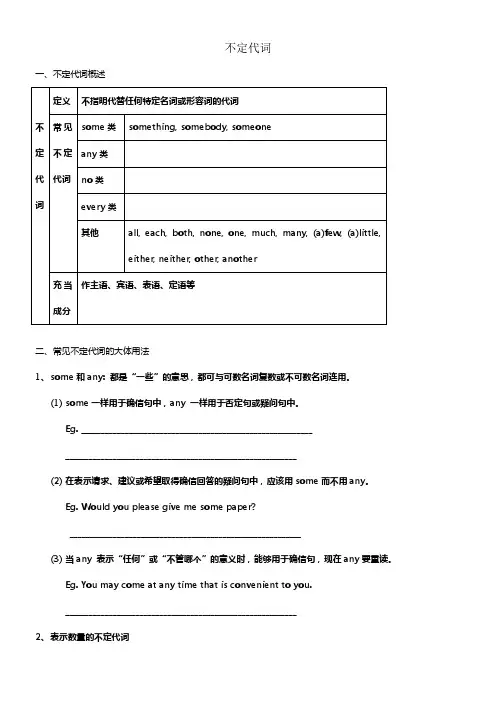
不定代词一、不定代词概述二、常见不定代词的大体用法1、some和any: 都是“一些”的意思,都可与可数名词复数或不可数名词连用。
(1)some一样用于确信句中,any 一样用于否定句或疑问句中。
Eg. ______________________________________________________________________________________________________________________(2)在表示请求、建议或希望取得确信回答的疑问句中,应该用some而不用any。
Eg. Would you please give me some paper?___________________________________________________________(3)当any 表示“任何”或“不管哪个”的意义时,能够用于确信句,现在any要重读。
Eg. You may come at any time that is convenient to you.___________________________________________________________2、表示数量的不定代词(1)many______, few_______, a few_______, 用以代替或修饰可数名词。
(2)much______, little_______, a little________,用以代替或修饰不可数名词。
(3) _______和_______表示确信意义,_______和_______表示否定意义。
(4)a lot of 和plenty of 等短语既能够修饰可数名词,又能够修饰不可数名词。
3、表示二者和三者的不定代词(1)表示二者: both, either, neither (2)表示三者: all, any, none, every(3)表示确信:both, all (4)表示否定:none, neither练一练:用以上不定代词填空。
完整不定代词的用法讲解及练习题1) no表示“没有”,用于肯定句中,修饰可数名词和不可数名词。
There is no milk in the fridge.冰箱里没有牛奶。
No one can deny the XXX.没有人能否认教育的重要性。
2) XXX表示“两者都不”,用于否定句中,修饰两个人或物。
Neither of the ns is XXX.两个选项都不令人满意。
XXX Tom nor Jack is coming to the party.汤姆和XXX都不来参加聚会。
3) none表示“没有一个”,修饰可数名词和不可数名词,用于否定句和疑问句中。
None of the students passed the exam.没有一个学生通过了考试。
None of us knows the answer.我们谁也不知道答案。
No can be used to modify both singular and XXX。
For example。
time and tide wait for no man.XXX of the two ns is correct。
For example。
neither answer is correct.None can be used to indicate that there is not a single person or thing。
and can refer to both countable nouns (when there are more than two people or things) and XXX。
For example。
none of the students failed the XXX.Few means "not many," while a few means "a small number" and is used to modify countable nouns。
初一英语语法练习不定代词用法及练习初一英语语法练习不定代词用法及练习(一) some 的用法(1)some 通常指不定数量“一些”修饰代替可数名词复数或不可数名词,即可以指人,又可以指物。
常用在肯定句中。
e.g. He has some Chinese paintings.Some like sports, others like music.(2)some 也可以用在表示“请求,建议,反问”的句子中,期待得到对方的肯定回答。
e.g. Would you like some coffee?Didn’t he give you some books?(3) some 有时可以修饰单数可数名词,表示“某个”e.g. This morning, some boy asked for you.There must be some reason for what he’s done.(4) some 也可以修饰数词,表示“大约”e.g. It took me some twenty days to get there.(二) any 的用法(1)不定代词any和some一样表示不定数量“一些”,修饰和代替可数名词复数和不可数名词,既可指人又可指物。
但一般用在否定句、疑问句,条件从句中。
e.g. Ask me if you have any questions?Do you have any questions to ask?I don't know any of the students.Do you have any questions? If you have any, don' t hesitate to ask me.There isn't any tea left. I'll go and make some for you.(2)用于肯定句中,表示“任何—个”,修饰单数可数名词和不可数名词。
初一英语不定代词试题答案及解析1.—Did you see _______ at the door? There is a boy waiting for you.—No, I saw_______.A.something; anything B.anyone; nobodyC.nothing; anything D.anyone; somebody【答案】B【解析】句意:—你没有看到门旁边有人吗?有一个小孩在等你。
—没有,我看不到有人。
根据句意第一空是在疑问句中指“某人”,所以用anyone;第二空是指“没有人”,所以是nobody,故选B。
【考点】考查不定代词的用法2. -What else do you need?-__________else. I get everything ready now.A.Everything B.NothingC.Something D.Anything【答案】B【解析】句意:—你还需要什么?—没什么了,现在一切准备好了。
根据句意“一切准备好了”,说明不需要什么了,所以选否定形式词nothing,故选B。
【考点】考查不定代词的用法。
3. There are only students in the classroom. Where are the others?A.a few B.few C.a little D.little【答案】A【解析】句意:教室里只有一些学生,其他的去哪了?a few 或few 修饰可数名词;a little 或little 修饰不可数名词。
这里空后的名词是students,是一个可数名词,故排除C和D。
a few 表示肯定的意思,一点儿;few 表示否定的意思,几乎没有。
根据句意可知,教室里有一些学生,故应该选A。
【考点】考查形容词。
4.—Do you have a small mouth?—No, I don’t. I have a wide ____.A.it B.one C.them D.ones【答案】B【解析】在英语中,为了避免与上文提到的“人或物”重复, 常用one进行代替。
不定代词二、常见不定代词的基本用法1、some和any: 都是“一些”的意思,都可与可数名词复数或不可数名词连用。
(1)some一般用于肯定句中,any 一般用于否定句或疑问句中。
Eg. ______________________________________________________________________________________________________________________(2)在表示请求、建议或希望得到肯定回答的疑问句中,应该用some而不用any。
Eg. Would you please give me some paper?___________________________________________________________(3)当any 表示“任何”或“无论哪一个”的意义时,可以用于肯定句,此时any要重读。
Eg. You may come at any time that is convenient to you.___________________________________________________________2、表示数量的不定代词(1)many______, few_______, a few_______, 用以代替或修饰可数名词。
(2)much______, little_______, a little________,用以代替或修饰不可数名词。
(3) _______和_______表示肯定意义,_______和_______表示否定意义。
(4)a lot of 和plenty of 等短语既可以修饰可数名词,又可以修饰不可数名词。
3、表示两者和三者的不定代词(1)表示两者: both, either, neither (2)表示三者: all, any, none, every(3)表示肯定:both, all (4)表示否定:none, neither练一练:用以上不定代词填空。
我的父母都是医生。
__________________________________街道的两边都种了树。
There are trees on ______ sides of the street.= There are trees on ______ side of the street.他有两个儿子,都不富有。
He has two sons. ______ of them is rich.他有三个儿子,都不富有。
He has three sons. ______ of them is rich.三、复合不定代词的用法(1)复合不定代词somebody ,something ,anything, nothing ,everything, everybody等是由some , any ,no ,every, 加上body, thing 构成的,叫做复合不定代词,在句子中当单数使用。
(2)somebody, something, someone 一般用于肯定句中;anything, anybody, anyone一般用于疑问句和否定句中。
(3)如果要在疑问句中表示请求、建议等肯定的意思或者盼望得到肯定的答复时,用somebody, someone 或something。
(4) 修饰复合不定代词的形容词或不定式应放在它们的后面。
Eg. He has nothing much to do today.他今天没有多少事情做。
Lucy hasn’t anything important to do. 露西没有任何重要时做。
四、疑难拓展1、few/a few/little/a little(1)后接名词的不同。
_______和_______后接可数名词复数,_______和_______后接不可数名词。
Eg. There are _______ new words in the text. 课文中有一些新单词。
Can you speak _______ English? 你能说一点英语吗?(2)表示肯定意义和否定意义的区别。
_______和________ 表示肯定,______和_______表示否定。
Eg. I have ________ friends there. I often play with them.There is _______ meat at home. Let’s buy some.2、other/others/the other/another(1)other表示“另一个”的意思,在句中可作主语、宾语或定语,不独立使用,通常修饰可数名词复数。
(2)others可独立使用,无范围限定。
(3)other和others前面加定冠词the 时表示特指,不加the 表示泛指。
The other表示两个中的另一个,常用于句型”one…the other…”,the others 表示全部其余的人或物。
Eg. I have two brothers. ____ is a doctor; ________ is a teacher.He is always ready to help _______.Five of them are in the classroom. What about _______?(4)another(另外一个,又一个),只能代替或修饰单数名词,可用作主语、宾语或定语,不独立使用。
前面不加冠词。
Eg. Don’t lose heart. Have another try.(5)Another 后可以跟few 或带数字的复数名词。
Eg. Just think what our town will be like in another few years.You’d better stay in bed for another two weeks.3、部分否定及完全否定Not与不定代词all, both, every等表示全部意义的词连用时构成部分否定;若要表示完全否定,则需要换用none, neither, no 等。
练一练:翻译下列句子。
All of the students like the novel.___________________________________Not all of the students like the novel. ___________________________________All of the students don’t like the novel.__________________________________None of the students like the novel. ___________________________________4、all, both, each等用作同位语若用作主语同位语,主语可以是名词或代词;若用作宾语等其他成分的同位语,则宾语等成分必须是人称代词,而不能时名词。
Eg. We all have read it.(all修饰的主语是代词)The village all have been destroyed.(all修饰的主语是名词)They told us all to wait here.(all 修饰的宾语是代词)5、one 和it 的区别使用(1)it 指代前面的某物。
Eg. Where is my pen? I can’t find it.(it 指代前面提到的那支笔)(2)one可以指人,也可以指物。
用来代替上文中提到的单数可数名词以及避免重复,其复数形式为ones。
Eg. Your pen is so nice. I want to buy one like this.课堂演练一、单选。
1.The two fishermen saw_______ in the sky while they were fishing by a river.A. something strangeB. anything strangeC. strange somethingD. strange anything2. --- Is ____ here? ---No. Bob and Tim have asked for leave.A. anybodyB. somebodyC. everybodyD. nobody3.---Do you want tea or coffee? ---______.I really don't mindA. BothB. NoneC. EitherD. Neither4. The old man has two sons .One is a soldier, _______ is a worker.A. otherB. the otherC. othersD. another5. There are shops on _____ side of the street.________ of them do not close till 12 at night.A. both; AllB. every; NoneC. either; SomeD. other; Many6. There is not ___ meat in my bowl. There is ____ chicken in it.A. some; anyB. any; someC. any; anyD. some; some7. Could you do___for me, please?A. everythingB. nothingC. somethingD. anything8. Sorry, I can't answer your question. I know____ about the subject.A. a littleB. littleC. fewD. a few9. ---Which would you like, a cup of tea or a glass of milk?----____, thanks. I think I'll just have a glass of water.A. NoneB. NeitherC. BothD. Either10. Tom shook his head and said to us there was _____ in the classroom.A. anybodyB. nobodyC. somebodyD. everybody11. Could I have _____ bottle of apple juice, please?A. anotherB. otherC. some moreD. second12. There are 25 techers in this grade. Eight of them are women teachers and ______ are menteachers.A. the otherB. the othersC. othersD. other13. They were all tired, but _____of them took a rest.A. noneB. allC. bothD.either14. ---We have red and yellow T-shirts. Which colour do you like?--- I’m afraid ____. I think blue will be OK.A. bothB. eitherC. neitherD. none15. ---Can I come this afternoon o tomorrow morning?---_____ is OK. I’m free today and tomorrow.A. EitherB. NeitherC. BothD. None二、按要求完成句子。